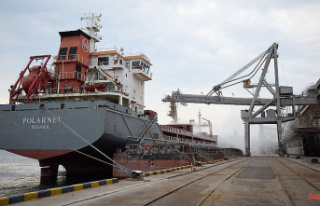With an EU program worth billions behind her, Foreign Minister Baerbock has announced joint infrastructure projects in Kazakhstan. The goal: The huge country should deliver green hydrogen from 2030.
In the future, Germany wants to purchase large quantities of green hydrogen from Kazakhstan. During a visit to the capital Astana, Foreign Minister Annalena Baerbock said that projects in the areas of digital, energy and transport should be launched together with the EU. This should also bind the former Soviet republic more closely to Europe.
The EU's "Global Gateway" initiative plays an important role in this - a 300 billion euro program designed to help poorer countries expand their infrastructure. The project competes with the "New Silk Road" that China has been working on in many countries for years. Kazakhstan and also Uzbekistan - the next stop on Baerbock's journey - traditionally have close ties to their big neighbors China and Russia.
A hydrogen project in the Caspian Sea region is an example of a common and sustainable future, said Baerbock after a meeting with Kazakh Foreign Minister Muchtar Tleuberdi. From 2030, wind energy could produce three million tons of green hydrogen there by electrolysis with water from the Caspian Sea.
Without naming China, Baerbock said other countries are trying to expand their influence in many parts of the world, "not only with military force, but also through economic deals that hide a web of dependencies". Germany wants other economic relations - "fair, on an equal footing, without gag loans and without a hidden agenda".
Kazakhstan has only 19 million inhabitants, but it is the ninth largest country in the world in terms of area. It is Germany's most important economic partner in Central Asia and has large raw material reserves. In total, more than 200 German companies are active in the country. The country also distanced itself from Russia in the Ukraine war. At the United Nations, Kazakhstan abstained from votes condemning Russia's war against Ukraine and the annexation of Ukrainian territory.
In January there was serious unrest there with more than 200 dead. Initial resentment about increased fuel prices turned into violent riots critical of the government. In the meantime, President Kassym-Jomart Tokayev has also brought Russian soldiers into the country. In the summer, however, Tokaev said at a panel discussion with Kremlin chief Vladimir Putin that he would not recognize "quasi-state areas" such as the eastern Ukrainian regions of Luhansk and Donetsk, which have since been annexed by Moscow, as independent states. Kazakhstan later took in 200,000 Russians fleeing Putin's partial mobilization.
After talks with Prime Minister Alikhan Smajylow, Baerbock met with representatives of civil society. In the afternoon, a visit to the memorial for prisoners of the Soviet women's prison Alzhir was on the agenda. More than 18,000 women were interned there by 1953, 8,000 of them for up to ten years.












